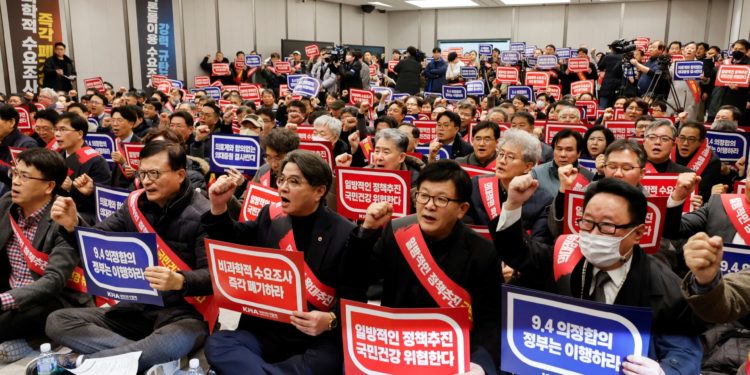
Only 294 of some 9,000 doctors who staged a mass walkout over government reforms have resumed work at their hospitals.
Thousands of South Korean trainee doctors who staged a mass walkout over healthcare reforms have refused to return to work, in defiance of a government deadline to end the strike or face legal action.
Yonhap News Agency reported on Thursday – the day of the deadline – that most of the young doctors protesting against the government’s push to boost medical school enrollments “showed little sign” of returning to their hospitals.
Vice Health Minister Park Min-soo told a briefing that as of Wednesday night, only 294 of the more than 9,000 trainee doctors who have left their posts were back at work.
“It is fortunate there are trainee doctors returning to patients’ side and I’d say they made the wise decision,” he said.
Park said he had contacted doctors involved in the strike seeking talks and hoped to meet them later Thursday, adding he was unsure “how many people will attend”.
“We’ve said that we won’t hold them responsible for leaving their worksites if they return by today,” he said. “Doctors are there to serve patients, and those patients are anxiously waiting for you. This isn’t the way to protest against the government.”
The Korean Medical Association (KMA), which has slammed the government’s “intimidation tactics” has not commented on possible talks. But a social media account run by young doctors shared a screenshot of a text message from the government and said: “You must be joking.”
The government is expected to begin formal steps towards punishment on Monday, as Friday is a national holiday.
Kim Chung-hwan, a senior health ministry official, said that starting March 4, the government will notify doctors who miss the deadline that it plans to suspend their licences, and will give them an opportunity to respond.
Under South Korean law, the government can order doctors back to work if it sees grave risks to public health. Those who refuse to abide by such orders can have their medical licences suspended for up to one year and also face up to three years in prison or a 30 million won (roughly $22,500) fine.
Those who receive prison sentences would be stripped of their medical licences.
Some observers say authorities will probably punish only leaders of the strike to avoid straining hospital operations further.
At the centre of the dispute is a government plan to admit 2,000 more applicants to medical schools starting next year, a 65 percent increase from the current 3,058.
The government says it aims to add up to 10,000 new doctors by 2035 to cope with the country’s fast-ageing population. Officials say South Korea’s doctor-to-population ratio is one of the lowest among industrialised countries.
The young doctors who are protesting say that universities are not ready to provide quality education to that many new students and the government should first address pay and working conditions before trying to increase the number of physicians.
But their critics say the striking doctors simply worry about expected lower income because of the sharply increased number of fellow doctors.
The walkout has caused disruption at main hospitals which were forced to turn away some patients and cancel surgeries and medical procedures.
An alliance of groups representing patients suffering severe illnesses, including cancer and Lou Gehrig’s disease, called on doctors to return to work so there can be discussions on how to improve the medical system for everyone.
Lee Kun-joo, who is in a hospice with terminal lung cancer, made a plea to doctors after saying he had been greatly helped by quality healthcare and well-trained doctors during his 25-year treatment for the disease.
“Your place is next to the patients, whatever the reasons and before you consider any conditions,” Lee said in a statement reminding the doctors they had taken an oath to hold “the health and well-being of my patient as my first consideration”.
The government’s plan is broadly popular with the South Korean public, according to a poll. President Yoon Suk-yeol, who has taken a hard line on the striking doctors, has also seen his approval ratings tick up.
Analysts say the government’s tough stance may play well for them ahead of legislative elections set for April 10.
“If the government were to back down now, they would perceive it as a major setback ahead of the upcoming general elections,” Kim Jae-heon, the secretary-general of an NGO advocating free medical care, told the AFP news agency.
But doctors “believe that stepping back at this point would result in their own disadvantage. It seems the current standoff will continue for a while”, he said.

